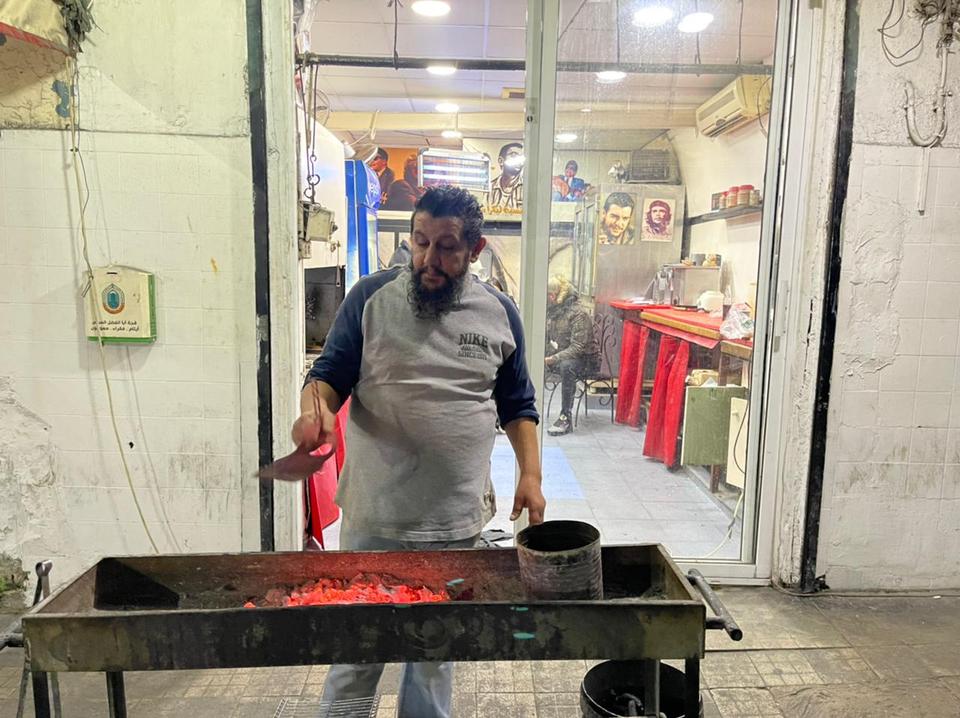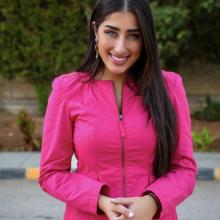Khandaq el Ghamiq is the embodiment of an anti-revolution, but at a closer look, they have misgivings about the way the country is being run, too.
More than two years ago, on October 17, 2019, a proposed WhatsApp tax brought hundreds of thousands of Lebanese to the streets to protest an increasingly unlivable Lebanon.
Ali Baroudi, a 30-year-old activist, organiser and entrepreneur, was one among many calling for a thawra, or revolution. For Baroudi and like-minded individuals, the government, widely seen as corrupt and incompetent, had lost public faith a long time ago.
“The WhatsApp tax was not the entire reason behind the revolution. It was just the last straw for us,” he says, recalling the early days of mid-October with a sense of both nostalgia for what it could have been, and a sense of loss of what never came to fruition.
At first, the thawra was a united force for change, bringing together people from all across a country that has long been rife with a sectarian divide.
There were early cracks in the thawra: the country’s two most powerful Shia political parties, Hezbollah and Amal, told their supporters to withdraw within the first few days after the groups felt they were being unfairly targeted. The divide deepened when supporters of the groups later attacked protesters for the same reason.
In the aftermath of the revolution, the country descended into crisis. Then-Prime Minister Saad Hariri’s government resigned and was replaced with a government that, though technocratic in theory, failed to deliver on much-needed reform. The local currency, which had been pegged to the dollar at a rate of 1,500 since the end of the country’s 1975-1990 civil war, began declining at an unprecedented rate, forcing many businesses, together with coronavirus-related closures, to shut their doors.
Then, on August 4, 2020, huge quantities of ammonium nitrate, improperly stored for years and to the knowledge of dozens of top officials, exploded at the Beirut Port, killing at least 218 people and injuring thousands more. Revolutionary groups and individuals, who had lost some stamina through the last eight months, came back with a vengeance, demanding answers and justice from a government that they insisted had blood on its hands.
Revolution-minded civil society groups, and progressive youth movements like Minteshreen — meaning both ‘We are Spreading,’ and ‘From October’— which Baroudi co-founded, also largely led the charge in rebuilding Beirut, and providing medical and material aid to the tens of thousands of people rendered homeless. According to Baroudi, it was around this time that Minteshreen became politically active.

The so-called technocratic government resigned in the wake of the blast, but the demands of protesters went otherwise unanswered. French and American probes into the blast were inconclusive, and the Lebanese investigation — still ongoing — has been overrun with the very politics that brought protesters to the streets in the first place.
It also stoked fires of discord between anti-Hezbollah/Amal camps, including revolutionary groups, and supporters. Strife reached a boiling point on October 14, 2021, nearly two years to the date after the start of the thawra, when Hezbollah and Amal crusaders took to the streets to demand the removal of Judge Tarik Bitar, the chief investigator of the Beirut Port blast case, who the two groups insist has politicised the investigation.
Consensus on what happened next is hard to come by: some accuse the Lebanese Forces, a powerful Christian party and one of the most anti-Hezbollah voices in the country, of striking first, whereas others say it was Hezbollah and Amal’s provocations—the protest passed through Tayouneh, which straddles the borders of wartime Shia and Christian stronghold neighbourhoods—that led to the hours-long exchanges of gunfire that left seven people dead in the most violent flare-up in Beirut in years.
But much like other major displays of advocacy, protest, or violence in Lebanon, the Tayouneh clashes did not spur change for the blast investigation — Bitar was not removed, but his probe remains hampered with political hurdles and delays — or Lebanon at large.
In the time since, the lira has only continued to spiral, hitting a record low of 30,000 Lebanese lira to the dollar at the beginning of the week, and further impairing the purchasing power of Lebanese, eighty percent of whom now live in poverty.
Where is the revolution?
For tens of thousands of Lebanese — both those who live in Lebanon and the estimated 15 million of the diaspora — the fate of the country rests in this year’s elections, for which advocates have mobilised with the hope of unseating long-standing politicians and replacing them with young, technocratic, progressive candidates with no attachment to traditional political parties. Some are running independently, whereas others are running under Minteshreen itself, the first and only progressive party to have registered with the Ministry of Interior since the protests began, according to Baroudi.
He’s cautiously optimistic about the change elections could bring, but he’s also taken a step back from the political focus of thawra, saying he’s weary of reinventing the same follow-the-leader dynamics that have plagued the country for decades.
Instead, he’s invested in renovating an old apartment in Beirut’s Hamra neighbourhood, which he lovingly refers to as the “secular hotspot of the Middle East''. He’s been renovating it for months, and it now bears the bones of what he imagines it could be: a library, a vocational training centre, a self-service cafe, and a podcast studio, where Lebanese youth, who may not have the money to purchase thousands of dollars in equipment, can rent out studio time at a low cost. He hopes the community centre, which he’s called The ARK, will also provide jobs in the area, which rests squarely between some of the country’s most popular universities.
“I know what happens outside affects what happens inside, but let this be a safe place,” he says, leading the way through each room, already decked out with tables, chairs, and whiteboards.
For him, revolution is both political and deeply personal: it must display, in the immediate, an alternative reality to the current situation, which he hopes to provide through education and job training. It must also be inclusive, and actively work to reach out to marginalised communities.
“I think of it like Lebanon is a sick person walking into a clinic. What does it need to get better?” he asks.
“For me, it was an economic piece. If I can get someone a job, or the training to get there, then they can stand on their own two feet, and they can feel they are a part of the global economy.”
He also hopes that hosting cultural events at the ARK will help develop a sense of wholesome Lebanese identity regardless of religion or background. Having spent five years in prison with people across every sect, he says he knows that dialogue across the spectrum is possible, but will take dedicated outreach. He admits that the thawra — which has previously drawn criticism of elitism — has not always done a great job of going deeper into the Lebanese society.
Revolution… and resistance
Interestingly, Baroudi’s sentiments seem to have a support base a few kilometres away in the Amal-stronghold of Khandaq el Ghamiq, or ‘the deep trench’ in Arabic. It’s a poor neighbourhood, and it’s long been stereotyped to be dangerous, and violent.
For many, Khandaq is the embodiment of an anti-revolution: many residents beat and attacked protesters in the early days of the thawra, a punishment for cursing leaders like Nabih Berri and Hassan Nasrallah, who some residents believe were unfairly targeted in comparison to other sect leaders like Saad Hariri, Walid Jumblatt, or Samir Geagea.
But inside a butcher shop on the main street of Khandaq, which, at 6pm is still buzzing with people despite most shops having closed for the day, residents say Khandaq is, in fact, not anti-revolution at all.
“In my neighbourhood, we have the highest talents, the smartest people, but you’d never know that because the media only sees certain parts of the neighbourhood,” says a man who identifies himself as Salem, between bites of a sandwich.
The owner of the shop, Hassan Khalife, who offers a beer stacked behind soda cans in his packed fridge, acknowledges that, through the crisis, many people have been faced with a desperate conundrum: sever their support for political groups and break the cycle of politics that has polluted Lebanon, or risk losing the money, food, and other material goods provided by political parties like Amal and Hezbollah, which are now harder to purchase than ever before.
“Last week, my mom needed to go to the hospital. The bill was seven million. If we’re sick, we can’t afford it, so we have to go to a party,” he explains.
“Of course, we want to be in the revolution. But we can’t.”

Residents inside Khalife’s shop, including Khalife, make one thing clear, however: they may disagree with the internal politics of Hezbollah and Amal, but they will always be with the resistance, or standing militarily against Israel, the hallmark stance of both groups, but a red line for many Lebanese revolutionaries, who believe the country is footing the bill for Hezbollah’s military activity, particularly as relations with the anti-Hezbollah Gulf states continue to worsen.
‘Hamdulillah’
Questions over the progress of the thawra are difficult, in part because demands differ depending on who is holding the microphone: can a revolution exist without the support of the country’s most vulnerable citizens? Does one have to be staunchly anti-Hezbollah in order to be a revolutionary? And, perhaps most importantly, who gets to speak for the revolution?
According to Baroudi, any sustainable progress is going to require a mindset shift, regardless of political affiliation, or lack thereof. For him, people need to talk to each other as if their country depends on it.
Largely, as people continue to descend into poverty, it does.
“In Lebanon, when people say how are you, we always say ‘Hamdulillah’ (Praise be to God),” he says.
“I think we said it so much, God got convinced that we are doing okay.”














0 Comments